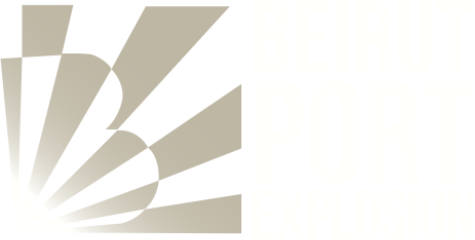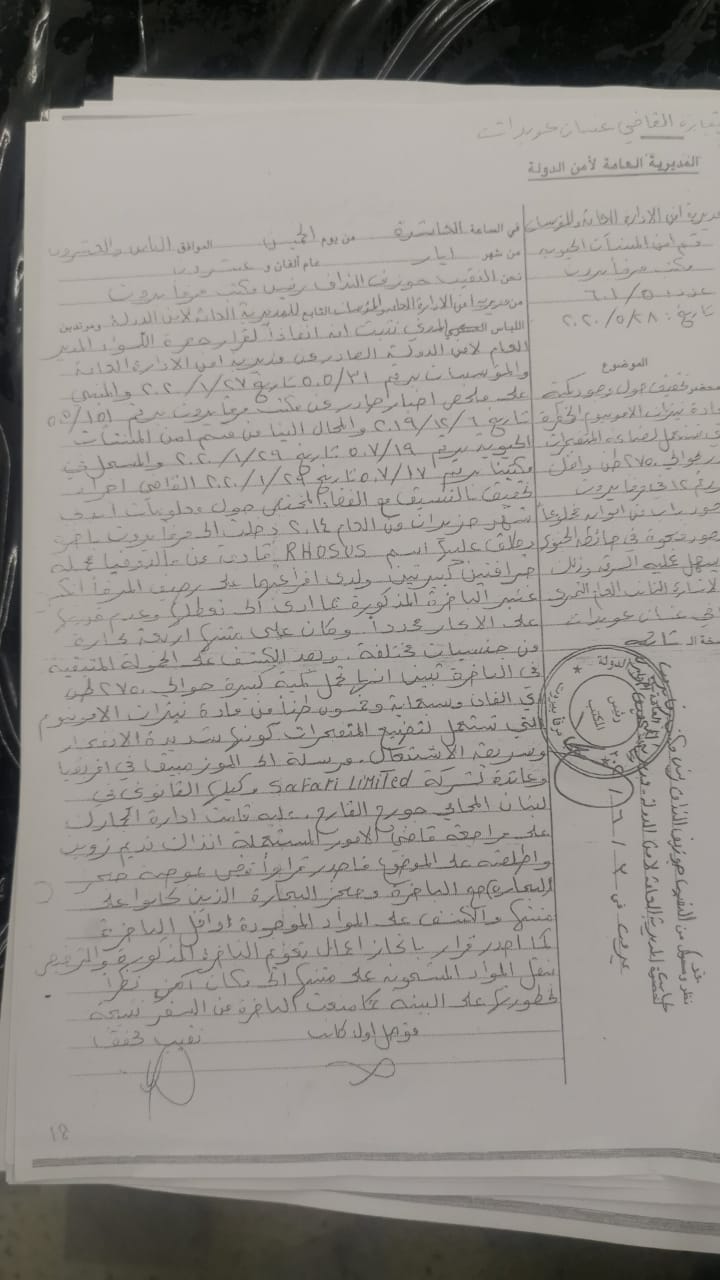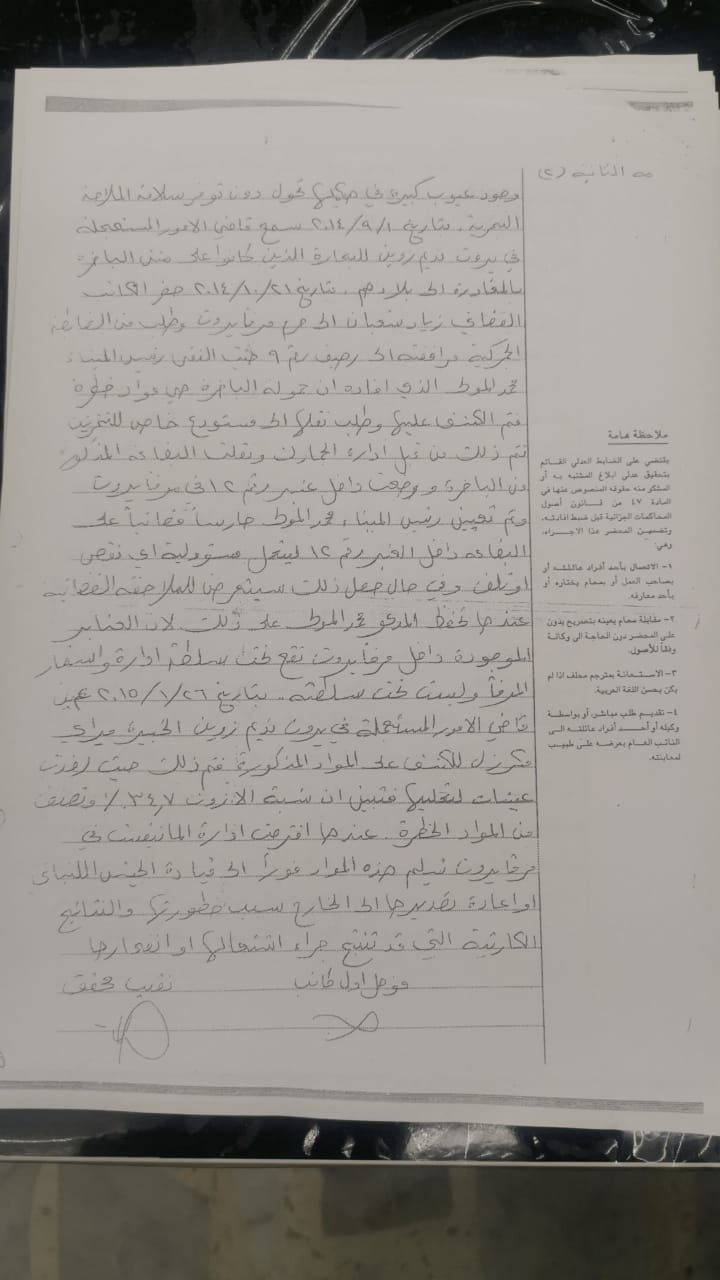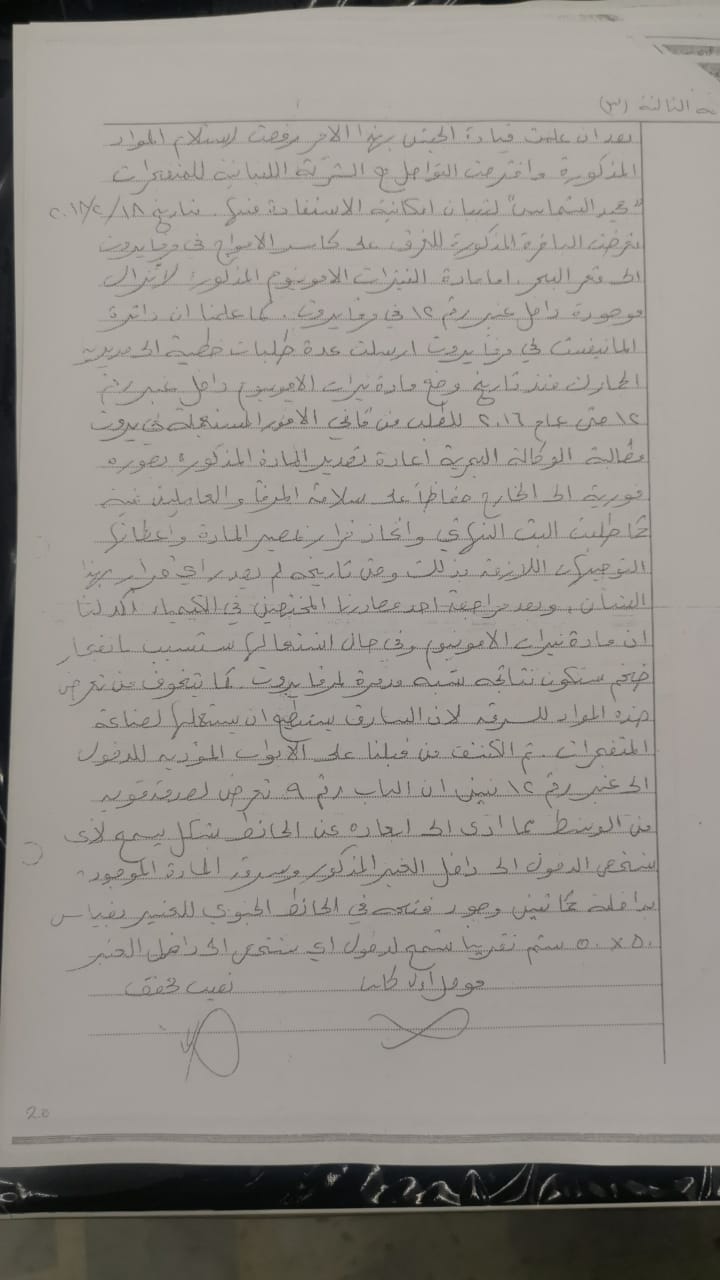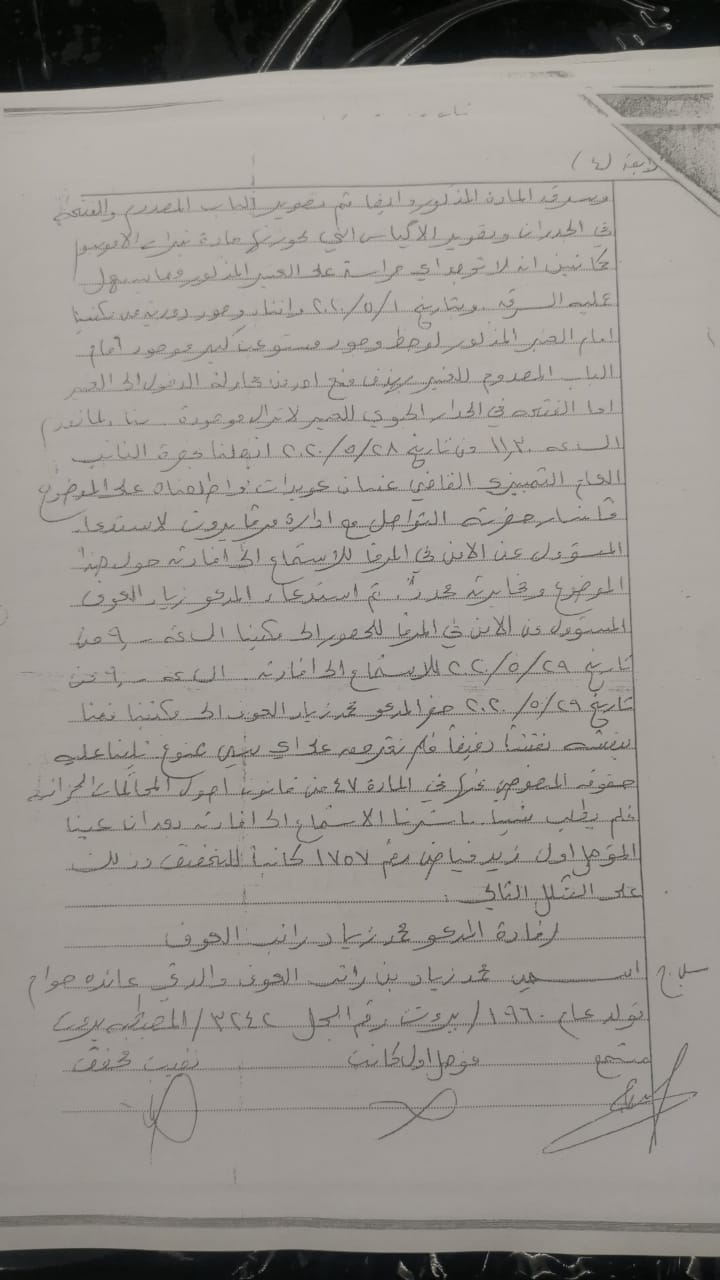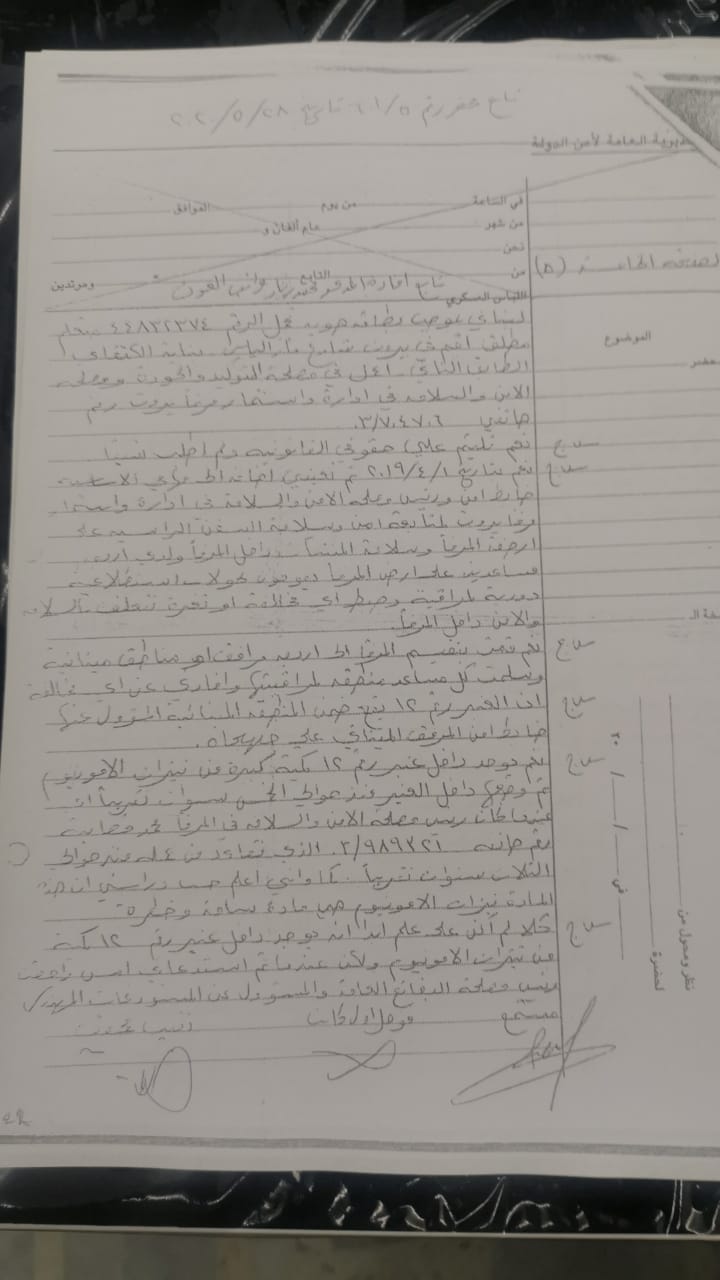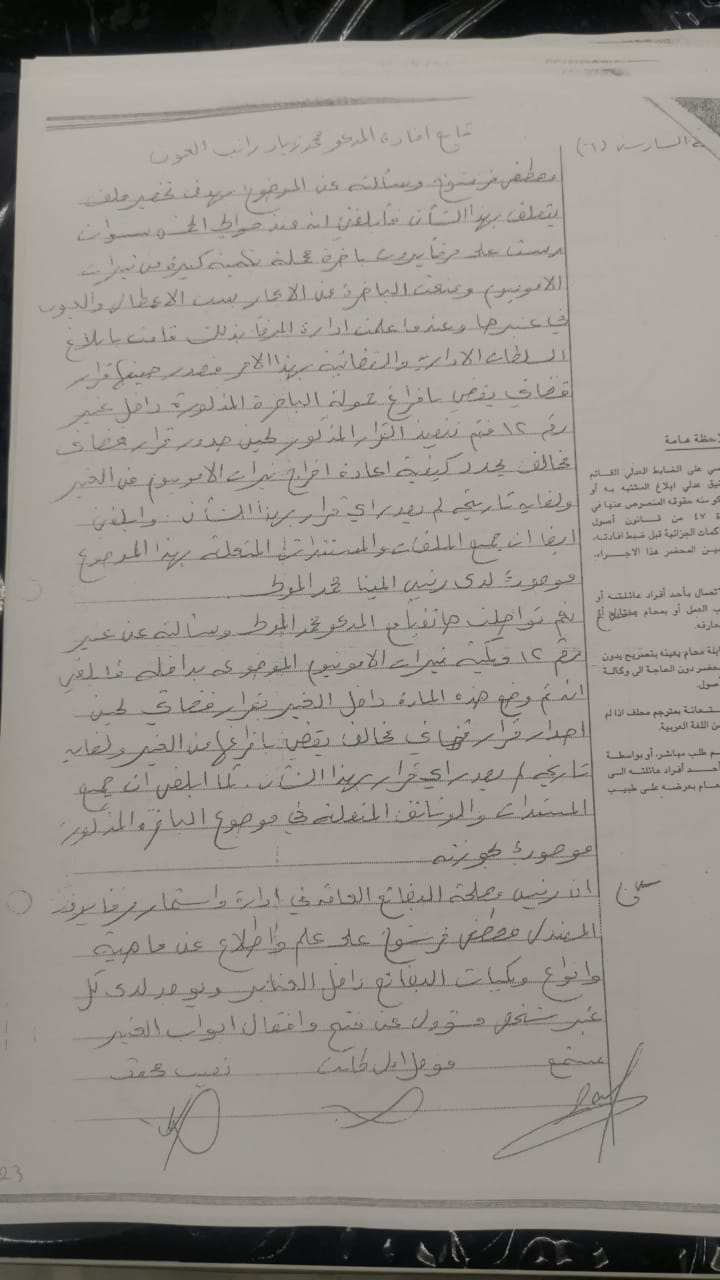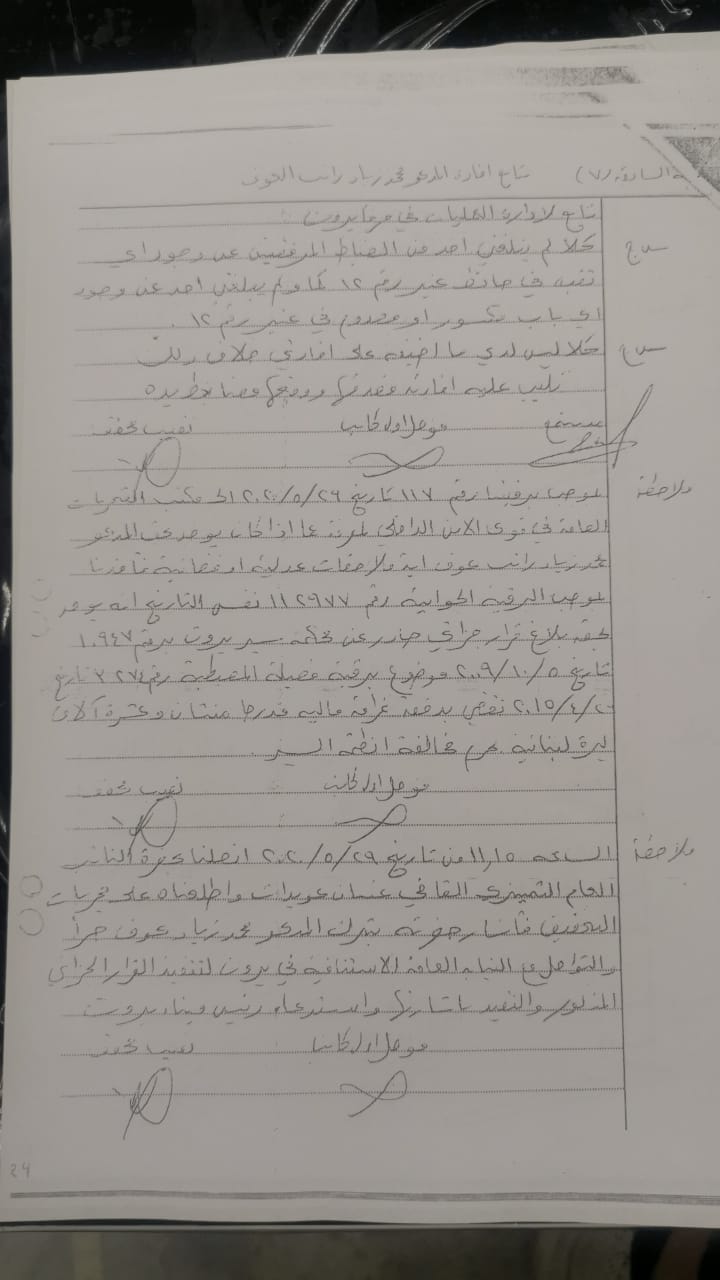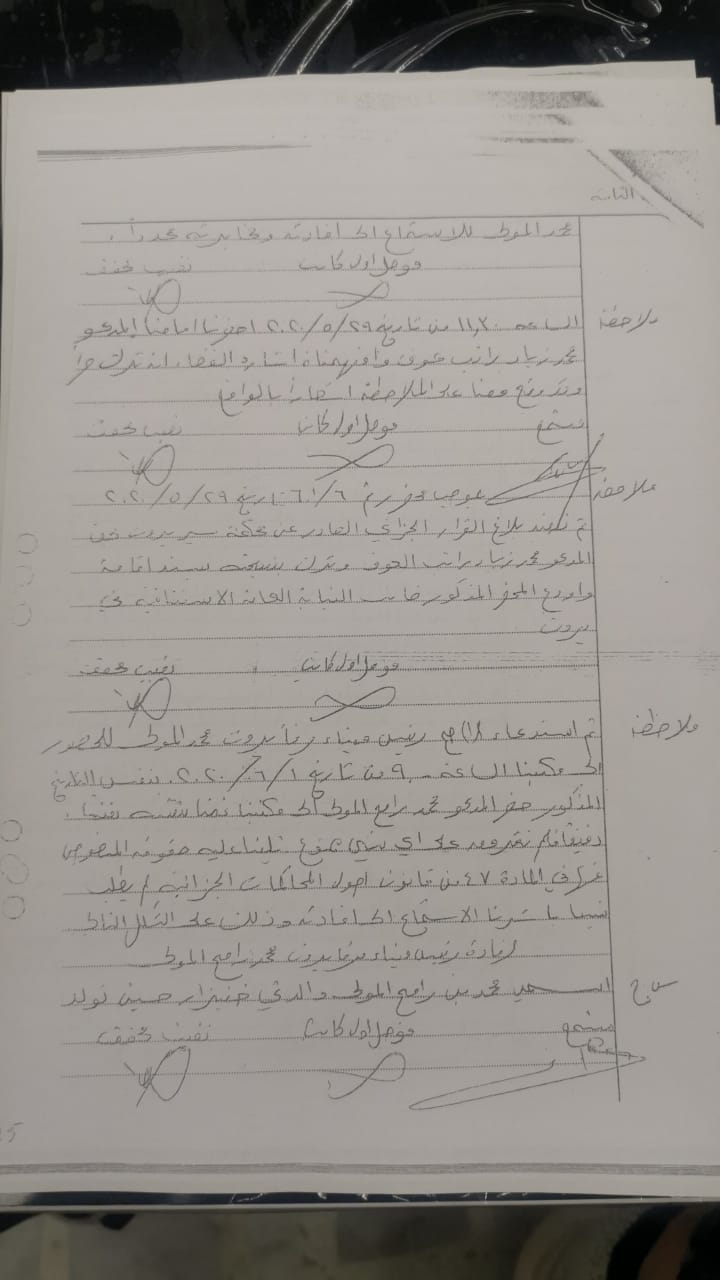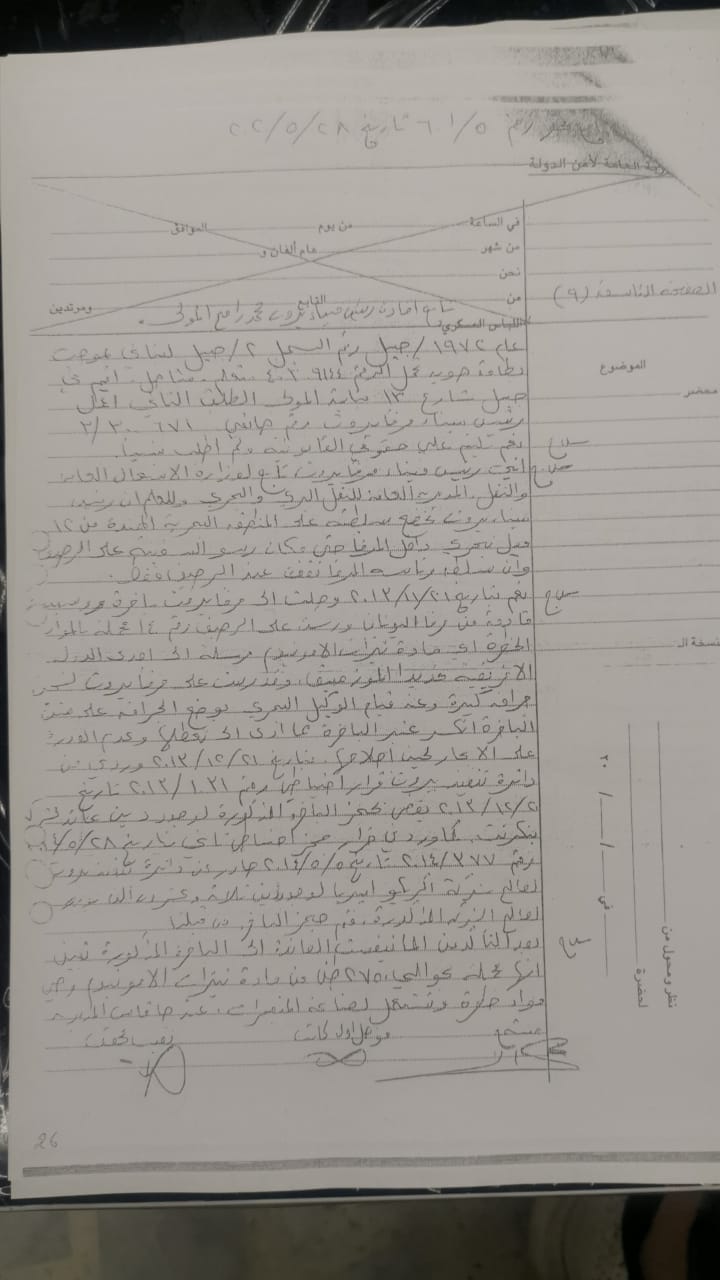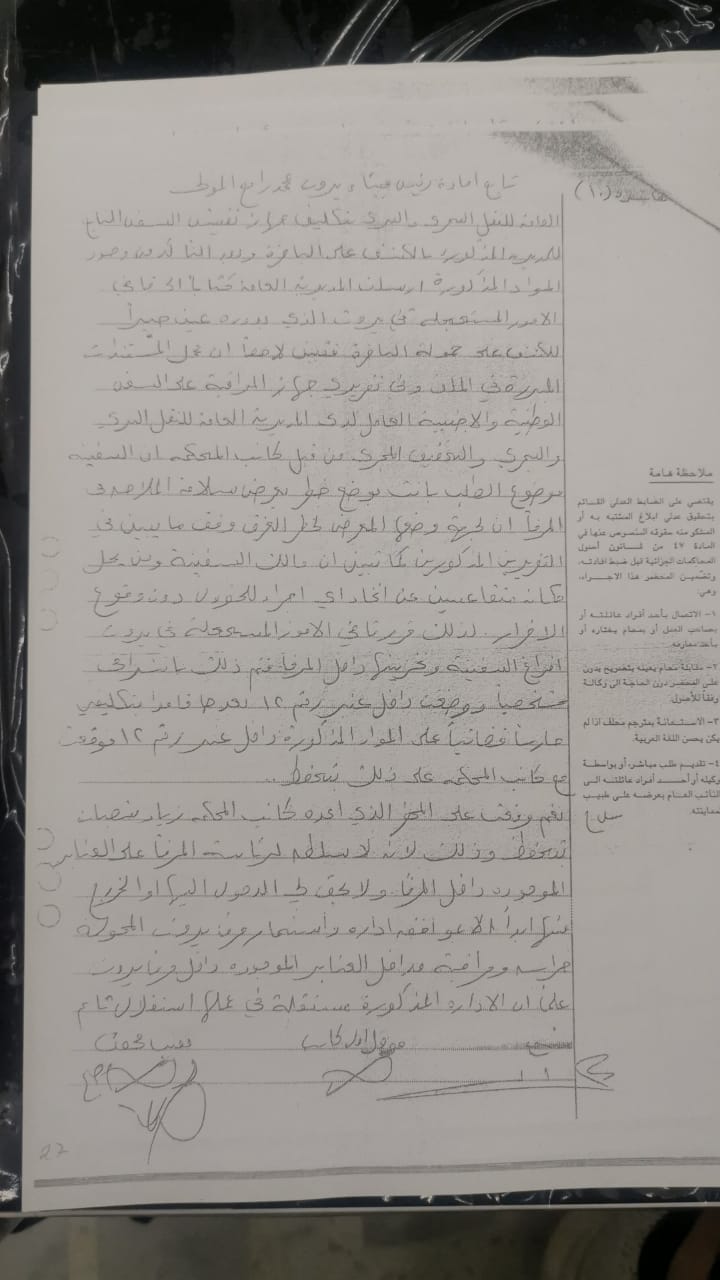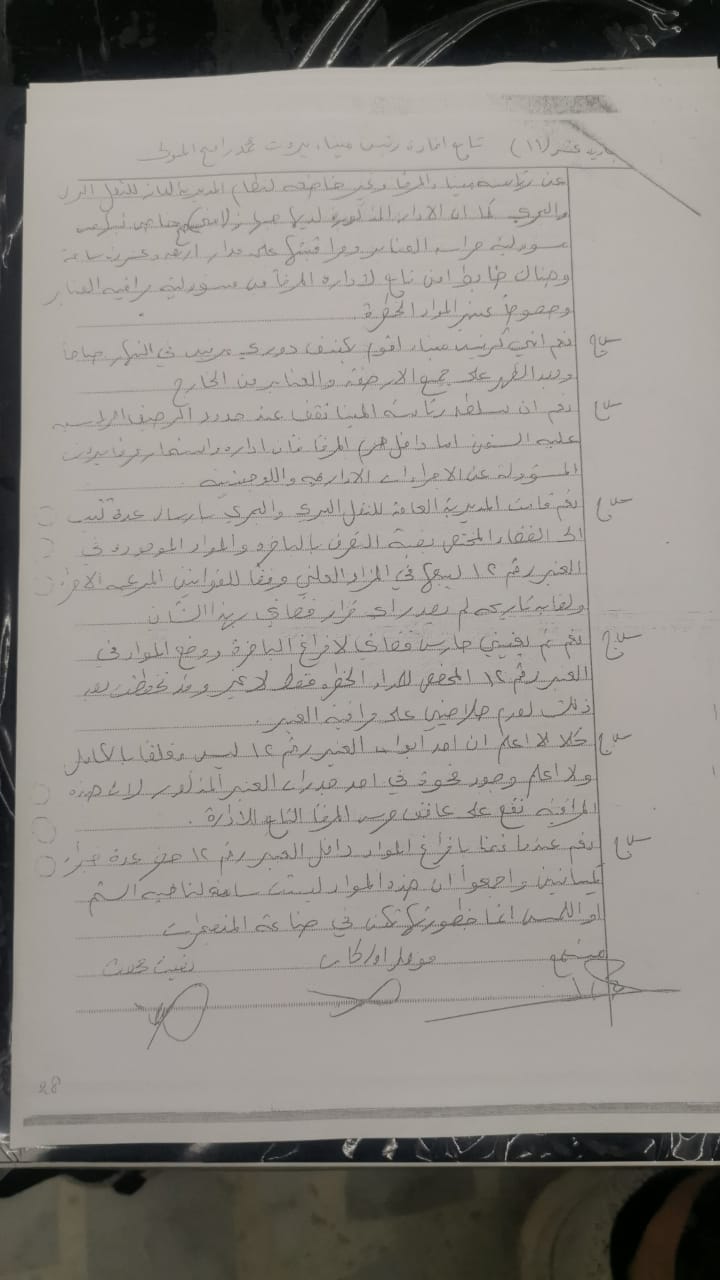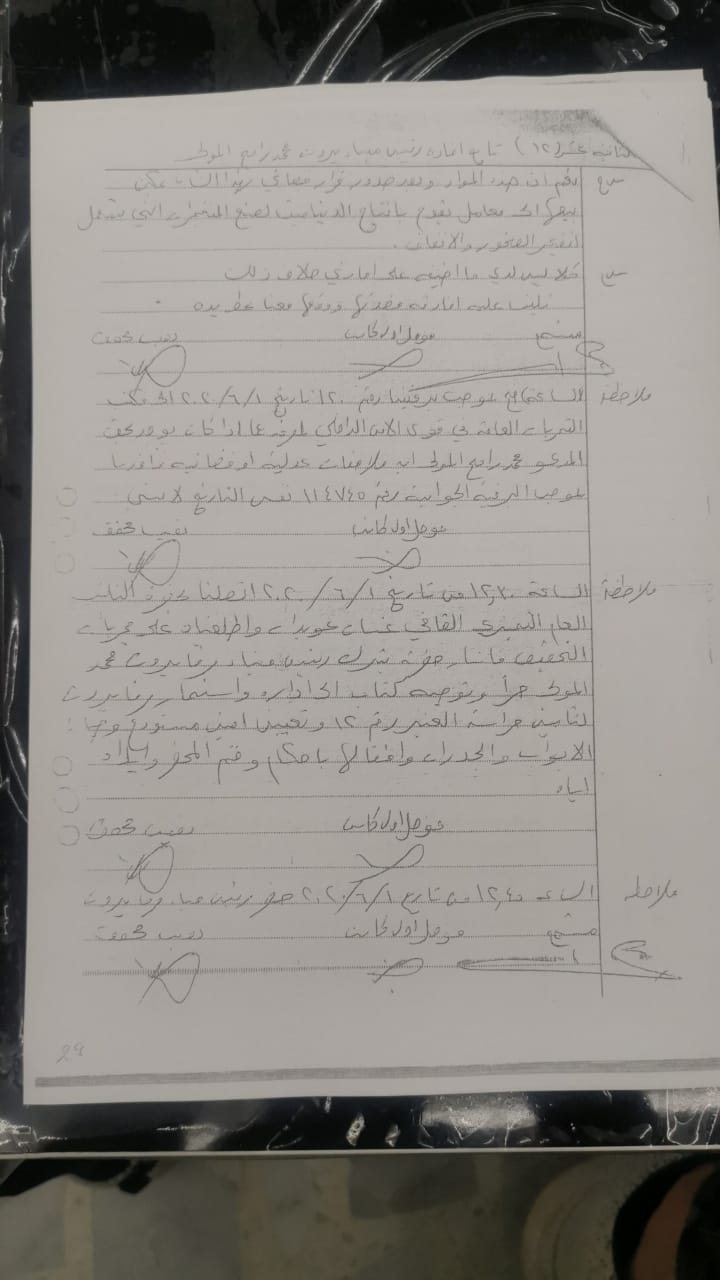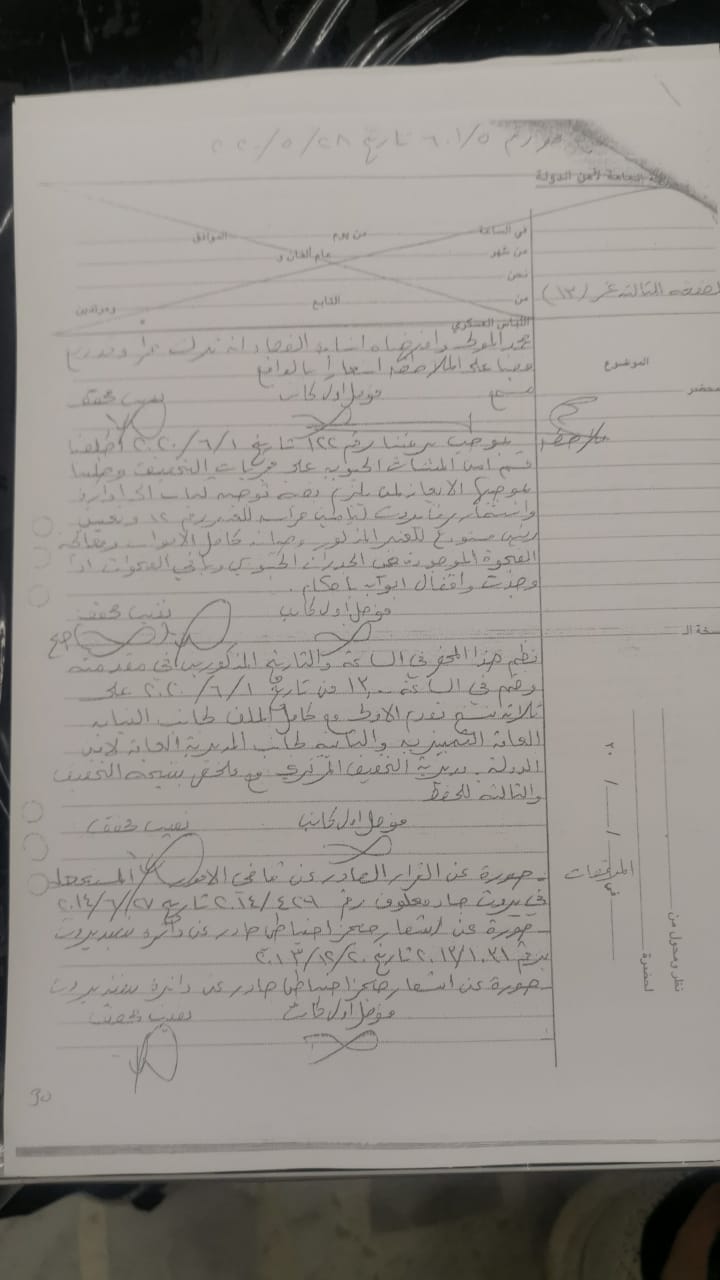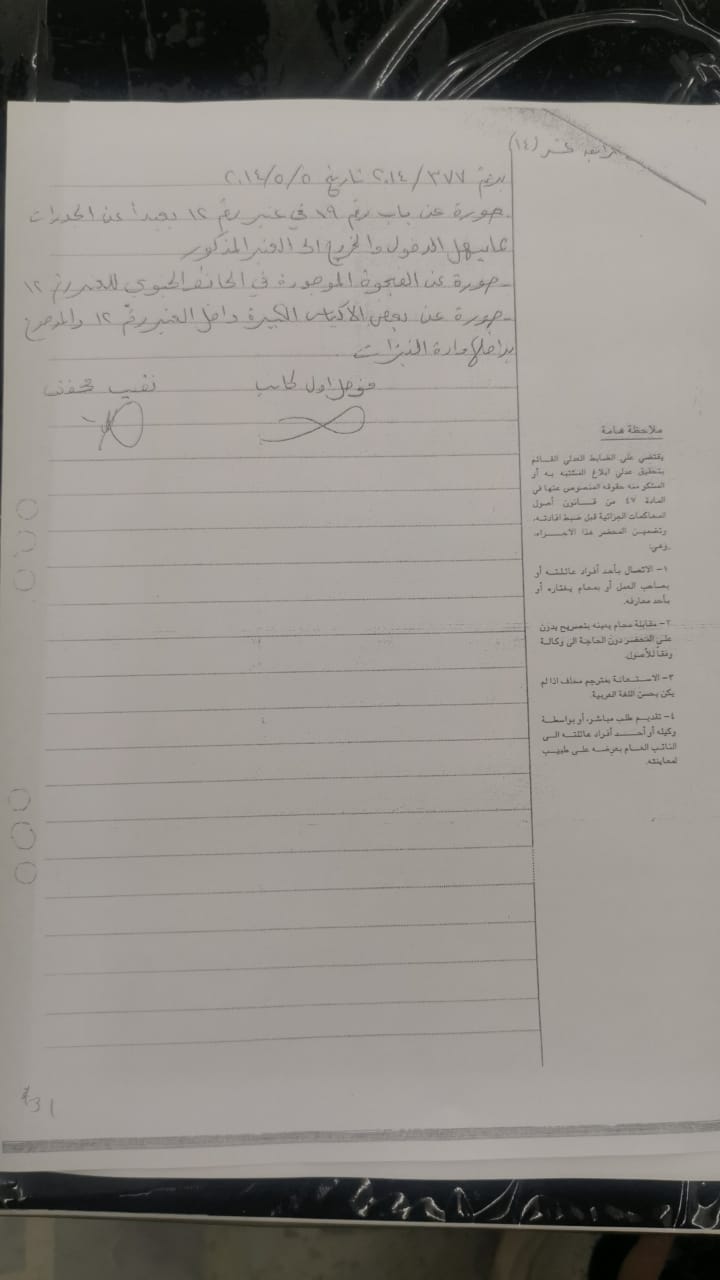May 28, 2020 Head of State Security at Beirut Port Investigation
[NOTE: This document has been translated in parts, excluding sections that are illegible or not central to the investigation about the ammonium nitrate. The report contains factual errors, some of which have been commented on in Human rights watch reports, They Killed Us from the Inside]
(left to right)
[HEADER] [illegible] Judge Ghassan Oueidat
The Directorate General of State Security
[RIGHT HAND MARGIN]
The Directorate General of State Security
Directorate of Public Administration and Institutions Security
Vital Facility Security Division
Beirut Port Office
No. 5/601 [illegible]
Date: May 28, 2020
Subject: [Several parts are illegible, but the following could be understood] An investigation based on instructions from Cassation Attorney General Ghassan Oueidat regarding nearly 2,750 tons of hazardous ammonium nitrate, in hangar 12 of the Beirut port and a dislodged door and hole in the southern wall that facilitates theft.
[MAIN TEXT]
At 10 o’clock, Thursday, May 28, 2020, we, Captain Joseph Naddaf, the head of Beirut Port’s State Security office [illegible], in plain clothes, confirm that in the implementation of the State Security director general’s decision, issued by the Directorate of Public Administration and Institutions [Security] under number 31/505 on January 27, 2020, based on a summary information report from the port [State Security] office no. 151/505 [illegible] on December 6, 2019, referred to us from the Vital Facility Security Division under no. 19/507, dated January 29, 2020 and registered in our office under no. 17/507 dated January 1, 2020, which stipulates to investigate, in coordination with competent judicial authorities, regarding information that in June 2014, a ship called RHOSUS entered Beirut port in provenance from Moldova, carrying two large [illegible]. While the cargo was being unloaded to the port dock, the cargo hold of the abovementioned ship broke, causing it to fall in disrepair and be unfit for navigation. On board were four sailors of various nationalities. After inspecting the ship’s remaining cargo, it was found it was carrying a large amount, about 2,750 tons, of ammonium nitrate, which is used to manufacture explosives since it is very explosive and flammable, which was sent to Mozambique, Africa, and belong to the company Safari Limited, legally represented in Lebanon by lawyer Georges al-Kareh. At the time, the Customs Authority consulted the judge of urgent affairs Nadim Zwein and informed him about this issue. [The judge] issued a decision to detain the sailors and impound the ship who were on board and inspect the substance [carried by] the ship. The judge also issued a decision to finish the procedures to refloat the abovementioned ship to refloat the ship and authorize removing the cargo to a safe location given the risk it causes to the environment. The ship was also prohibited from leaving due
page 2
to serious structural flaws that threaten maritime navigation safety. On September 1, 2014, the Beirut judge of urgent affairs Nadim Zwein allowed the sailors to return home. On October 21, 2014, judicial clerk Ziad Shaaban came to the premises of the Beirut port and asked the Customs Brigades to accompany him to dock 9, where he met harbor master Mohammad al-Mawla, who informed him that the ship was carrying a hazardous substance. It was inspected and he requested that it be removed and stockpiled in a special warehouse. That was done by the Customs Authority, and the abovementioned goods were removed from the ship and placed in Beirut port’s hangar 12. Harbor master Mohammad al-Mawla was appointed judicial guardian of the cargo placed in hangar 12, where he would be responsible for any loss or damage, and if such a thing happened, he would be prosecuted. At that point, Muhammad al-Mawla expressed his reservation because the hangars inside the Beirut port are under the authority of Gestion et Exploitation du Port de Beyrouth [GEPB] and not his. On January 26, 2015, the Beirut judge of urgent matters appointed expert Mireille Moukarzel to inspect the said substance, which was done. She took samples for analysis, which showed that the substance has a 34.7% nitrogen composition and is classified as hazardous. At that point, the Manifest Department suggested that this substance be handed over to the Lebanese Army or reexported due the risk it poses and the catastrophic consequences it could cause upon catching fire or exploding
page 3
After learning about this, the army leadership refused to receive the abovementioned substance and suggested that the Lebanese Explosives Company – Majid Shammas – should be contacted to check if it could make use of the substance. On February 18, 2018, the ship sank to sea bottom near the breakwater in the Beirut port. The abovementioned ammonium nitrate is still inside hangar 12 at the Beirut port. We also learnt that the Manifest Department in the Beirut port sent several written letters to the Directorate of Customs starting when the ammonium nitrate was placed inside hangar 12 until 2016, asking the Beirut judge of urgent matters to demand that the National Trading and Shipping Agency immediately re-export the abovementioned substance to guarantee the safety of the port and its workers. [The Manifest Department] requested that a final decision be taken regarding the fate of the substance along with necessary instructions. After consulting with one of chemical specialists, they confirmed that to us that ammonium nitrate, in case it caught fire, would cause a huge explosion with catastrophic consequences on the port of Beirut. We also fear that this material would get stolen, because the thief could use it to make explosives. We inspected the doors leading to hangar 12 and found that door 9 had received a strong impact in the middle, and as a result it was pushed away from the wall in such a way to allow anyone to enter the abovementioned hangar and steal the substance within. We also found that there was an opening in the hangar’s southern wall, measuring approximately 50 [cm] x 50 cm, which would allow anyone to enter the hangar
page 4
and steal the abovementioned substance. Photographs were taken of the impacted door, the hole in the wall, and the bags containing ammonium nitrate. It was also found that the abovementioned hangar is not being guarded, which facilitates theft. On January 5, 2020, while a patrol from our office was in front of the abovementioned hangar, a large container was seen in front of the impacted door the purpose of which is to prevent anyone from trying to access the hangar, while the hole in the southern wall was still present. Based on the aforementioned, at 11:30 on May 28, 2020 [illegible] cassation attorney general Ghassan Oueidat and we informed him about the issue. He communicated with the port’s management to summon the port’s security official to hear his statement about this
issue and [illegible]. Ziad al-Awf, the port’s security official, was summoned to our office at 9 o’clock, on May 29, 2020 to hear his statement. At 9 o’clock, on May 29, 2020, Mohammad Ziad al-Awf came to our office. We searched him thoroughly and did not find anything prohibited. We read his rights as stated in article 47 of the law of criminal procedures and he did not request anything. We started hearing his statement after appointing Petty Officer Zayd Fayyad, no. 1757, as investigation clerk, as
follows:
Statement of Mohammad Ziad Rateb al-Awf
Q&A – my name is Mohammad Ziad bin Rateb al-Awf, [personal details redacted].
page 5
I work in GEPB’s quality assurance and security and safety departments. My phone number is [redacted]
Q&A – Yes, you have read me my legal rights and I have not made any request.
Q&A – Yes, on April 1, 2019, in addition to my principal duties, I was appointed as security officer and head of the security and safety department in GEPB to oversee the security of anchored ships at the Beirut port docks and the safety of facilities within the port. I have [illegible] assistants on the port ground, who perform patrols to monitor and control any infraction or security and safety gap inside the port.
Q&A – Yes, I divided the port into four areas and appointed an assistant to monitor each area and report any infraction.
Q&A – Hangar 12 is part of the port area for which port security officer Ali Jahjah is responsible.
Q&A – Yes, inside hangar 12, there is a large amount of ammonium nitrate that was placed inside the hangar approximately five years ago, when Mohammad [illegible] was the head of the security and safety department at the port, and whose phone number is [redacted]. He retired around three years ago. I am aware, as a result of my studies, that ammonium nitrate is a toxic and dangerous substance.
Q&A – No, I was not aware at all that hangar 12 contains ammonium nitrate, but when I was summoned yesterday, I consulted the official responsible for general goods and warehouses engineer
page 6
Mustapha Farshoukh. I asked him about this issue to prepare a file about it, and he told me that about five years ago, a ship carrying a large amount of ammonium nitrate docked in the Beirut port. The ship was prohibited from leaving due to flaws and disrepairs in its cargo hold and when GEPB found out, it informed administrative and judicial authorities about this issue. A judicial decree was issued then to unload the abovementioned cargo into hangar 12, and the said judicial decision was executed pending another overriding judicial decision to determine how to remove the ammonium nitrate from the hangar. To date, no such decision has been issued. He also informed me that all the files and documents related to this issue are with harbor master Mohammad al-Mawla.
Yes, I spoke over the phone with Mohammad al-Mawla and asked him about hangar 12 and the amount of ammonium nitrate placed in it. He informed me that this substance was placed in the hangar due to a judicial decision pending an overriding decision to remove it from the hangar. To date, no decision has been issued in this regard. He also informed me that he possessed all the documents regarding the abovementioned ship.
Q&A – GEPB’s head of public goods engineer Mustapha Farshoukh is aware of the nature and amount of goods inside hangars. Each hangar has a person affiliated with the operations administration at the port who’s assigned to open and close the hangar doors.
page 7
Q&A – No, none of the [illegible] informed me about any hole in the wall of hangar 12. Also, nobody informed me about any broken or impacted door in hangar 12.
Q&A – No, I have nothing else to add to my statement.
His statement was read to him [illegible]
[Verifcation of al-Awf’s judicial record redacted].
Note: At 11:15, on May 29, 2020, we contacted cassation public prosecutor Ghassan Oueidat and informed him about the proceedings of the investigation. His instructions were to release Mohammad Ziad al-Awf and communicate with the Beirut appeals prosecution office to execute the abovementioned criminal sentence and follow its instruction, and to summon the Beirut port harbor master
page 8
Mohammad al-Mawla to hear his statement.
[Two notes explain the bureaucratic procedures by which al-Awf was released on May 29, 2020].
Note: The Beirut port harbor master Mohammad al-Mawla was summoned to our office at 9:00 on June 1, 2020. On the same date, Mohammad Rameh al-Mawla came to our office. We thoroughly searched him and did not find him in possession of anything prohibited. We read him his rights as per article 47of the law of criminal procedures. He did not make any request. We heard his statement as follows.
The statement of the Beirut port harbor master Mohammad Rameh al-Mawla
My name is Mohammad Rameh al-Mawla, [personal details redacted]
page 9
I work as the Beirut port harbor master. My phone number is [redacted].
Q&A – Yes, my rights were read to me, and I made no request.
Q&A – [illegible] the Beirut port harbor master reports to the Ministry of Public Works and Transport, the Directorate General of Land and Maritime Transport. It should be known that the Beirut harbor master’s authority covers the maritime area starting at 12 nautical miles within the port until the place where the ships are anchored at the dock, and that the authority of the harbor master does not extend beyond the dock.
Q&A – Yes, on November 21, 2013, a ship reached the Beirut port in provenance from Greece and was anchored at dock 14, carrying a hazardous substance, ammonium nitrate, which was sent to an African country, specifically Mozambique. It docked at the Beirut port to carry a large bulldozer, and when the maritime agent placed the bulldozer aboard the ship, the cargo hold broke, putting it in disrepair and rendering it unfit for navigation until it has been repaired. On December 21, 2013, I received a precautionary impounding decision from the Beirut Enforcement Department -decision number 1031/2013, dated December 20, 2013 – ordering the ship to be impounded because of a debt owed to Bunkernet. A second precautionary impounding decision also arrived, number 377/2014, issued by the Enforcement Department for the benefit of the company [illegible] because of an amount of [illegible] for the benefit of the abovementioned. We impounded the ship.
Q&A – After examining the ship’s manifest, it was found to be carrying around 2,750 tons of ammonium nitrate, which is a hazardous substance used in manufacturing explosives. Hence, the Directorate…
page 10
…General of Land and Maritime transport mandated the Ship Inspection Service affiliated with the said directorate, to inspect the ship. After verifying the presence of the said substance, the directorate general sent a letter to the Beirut judge of urgent matters, who, in his turn, appointed an expert to examine the ship’s cargo. It was later found that as per the [illegible] documents [illegible] on file; the two reports prepared by the ship inspection service done by the department that monitors national and foreign ships and which reports to the Directorate General of Land and Maritime Transport; and the investigation done by the court clerk that the ship in question was in a perilous condition – it jeopardizes navigational safety at the port because it could sink. It was also found that the owner of the ship and his representative had failed to take any measure to prevent damage. Hence, the Beirut judge of urgent matters decided to unload the ship and store its cargo inside the port, which took place under my supervision. Then, I was appointed judicial guard of the said substance inside hangar 12. I signed that [document] alongside the court clerk with reservation.
Q&A – Yes, I signed the report prepared by court clerk Ziad Shaaban with reservation because a harbor master has no authority over port hangars. I have no right to go into or out of the hangars without approval from GEPB, which is responsible for guarding and monitoring the entrances of the hangars inside the port. Its work is entirely independent of
page 11
the harbor master. GEPB does not follow the Directorate General of Land and Maritime Transport’s regulations and has its own security apparatus, whose responsibility is to guard and monitor the hangars around the clock. A security officer affiliated with GEPB is tasked with monitoring hangars, especially the hazardous material hangar.
Q&A – Yes, as the harbor master, I regularly examine [illegible] in the morning and afternoon all the docks as well as hangars from the outside.
Q&A – Yes, the authority of the harbor master is limited to the docks. Within the premises of the port, it is the GEPB who is responsible for administrative and logistical procedures.
Q&A – Yes, the Directorate General of Land and Maritime Transport sent several letters to competent judiciary authorities requesting action to be taken regarding the ship and requesting that the substance in hangar 12 be auctioned off according to applicable laws. To date, no judicial decision has been issued in this regard.
Q&A – Yes, I was appointed judicial guard to [oversee] the unloading of the ship and placing the goods in hangar 12, which is reserved for hazardous substances only, and I expressed my reservation about this because it is not within my authority to monitor the hangars.
Q&A – No, I am not aware that one of the hangar 12 doors is not completely shut, nor am I aware that there is a hole in one of the walls of the said hangar because this supervision is the responsibility of GEPB port guards.
Q&A – Yes, when we unloaded the cargo into hangar 12, several chemical experts were present and they all said that this is substance is not toxic if inhaled or touched, but that the danger it causes lies in the fact that it is used to manufacture explosives.
page 12
Q&A – Yes, upon a judicial decision in this regard, this substance can be sold to factories that manufacture explosives used to blow up rocks and tunnels.
Q&A – No, I have nothing further to add.
We read him his statement [illegible], which he signed.
[A note describes that a telegram was sent to Internal Security Forces about other judicial decisions.]
Note: At 12:30, on June 1, 2020, we contacted the cassation public prosecutor Judge Ghassan Oueidat and informed him about the investigation proceedings. He instructed to release harbor master Mohammad al-Mawla; and to send a letter to the GEPB requesting that it provides guards for hangar 12 and appoints a warehouse keeper, to perform maintenance on the doors and walls and seal them tightly, and to close the investigation report and submit it to him.
Note: At 12:45, on June 1, 2020 the Beirut port harbor master Mohamad al-Mawla came to the office
page 13
and we explained to him the judicial decision to release him [illegible].
Note: As per our telegram number 122 dated June 1, 2020, we informed the Vital Facility Security Division about the proceedings of the investigation, as a result we requested to direct whomever necessary to send a letter to Gestion… to provide guards for hangar 12 and appoint a keeper for the said hangar and to maintain all the doors and fix the hole in the southern doors and any other doors, and to seal the doors tightly.
This report was drafted at the time and date mentioned in the introduction and sealed at 13:00 of June 1 2020 in three copies, the first of which is presented with the entire file to the cassation prosecution office, the second to the directorate general of State Security – Central Investigation Directorate along with a summary of the investigation, and the third to be kept in the records.
Attachments:
– a copy of the decision by the Beirut judge of urgent matters Jad Maalouf, no. 429/2014, dated June 27, 2014
- A copy of a precautionary impounding notice issued by the Beirut Enforcement Department no. 1031/2013, dated December 20, 2013
- A copy of a precautionary impounding notice issued by the Beirut Enforcement Department no.377/2014, dated May 5, 2014
- A photograph of door 9 in hangar 12 being far from the walls, which facilitates going into and out of the said hangar
- A photograph of the hole in hangar 12’s southern wall
- A photograph of some of the large bags inside hangar 12 containing [ammonium] nitrate
[The last four pages are illegible]
